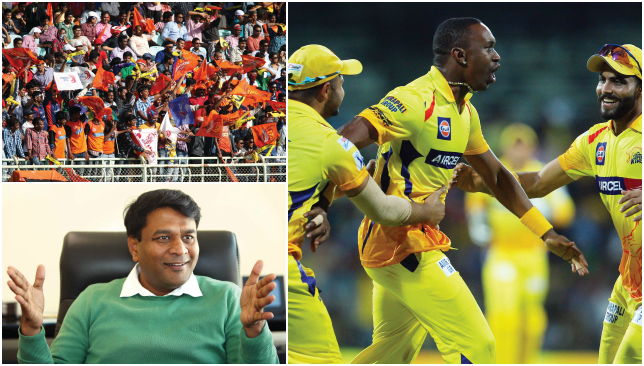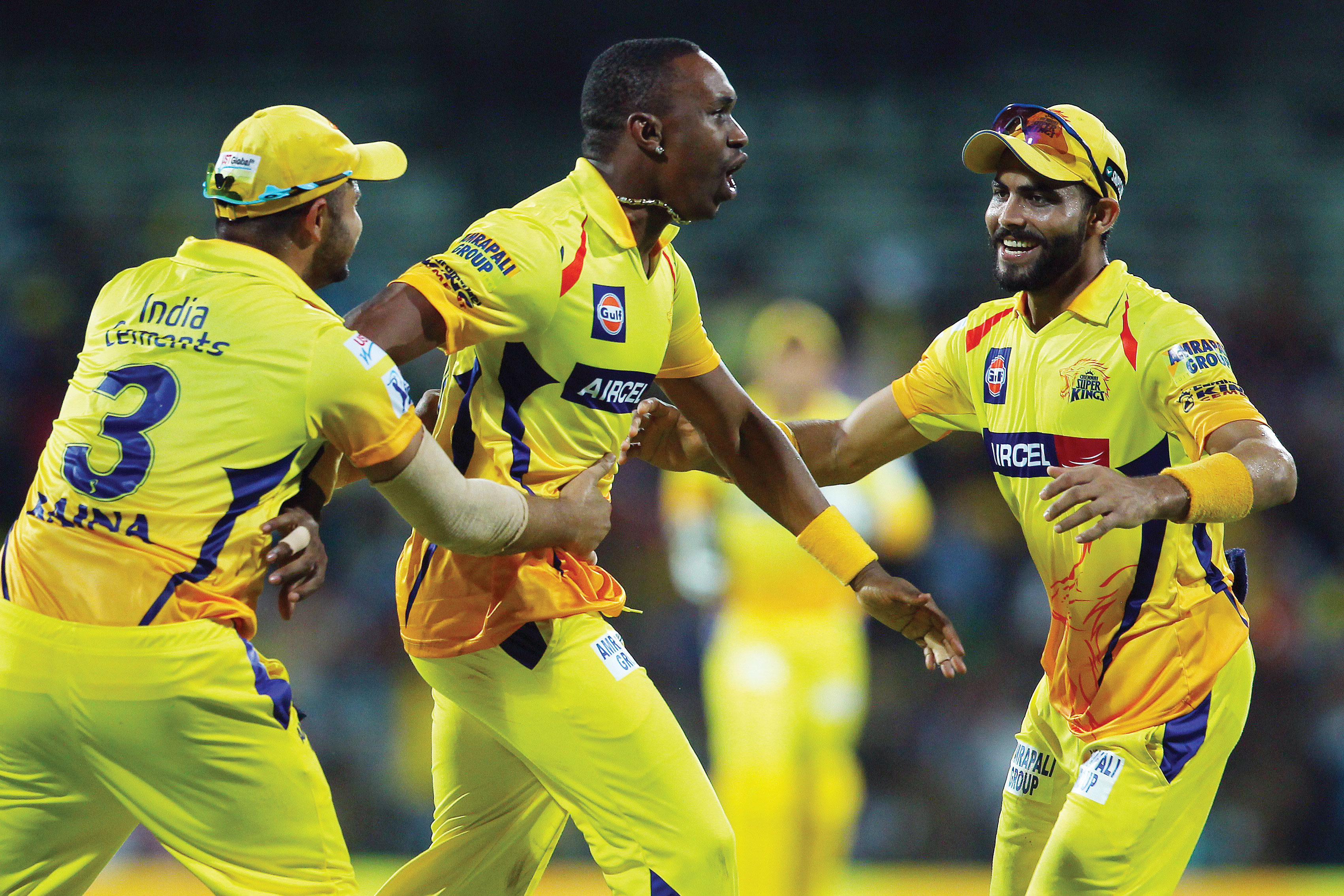
Just a cursory look at the deal signed by the two new Indian Premier League (IPL) franchisees – Pune and Rajkot – gives a clear impression that it does not make financial sense for the two successful bidders.
To begin with, unlike the other teams, both Pune and Rajkot will not be making any money from the central revenue pool.
The BCCI used a reverse bidding process with a base price of 400 million rupees ($6m). If a team won the bid at that amount, the IPL would have paid them $6m from the pool.
Instead, both Pune and Rajkot were purchased at a negative price – (-160m rupees or -$2.4m for Pune and -100m rupees or -$1.5m for Rajkot). That means the owners are going to pay that much money to the IPL instead of getting any part of the central revenue. The other franchisees are expected to earn 700m rupees ($10.5m) for the 2016 edition.
Including the payment to the BCCI, and the 660m rupees ($10m) cap on players’ salary, a very conservative estimate is that annual expenses for these franchisees are going to be approximately 1,000m rupees ($15m).

Secondly, both teams have a life span of only two years – equivalent to the length of the suspension being served by Chennai Super Kings and Rajasthan Royals. That is hardly any time frame to build up a team, or a brand. There is a real danger that most decisions by the owners will be keeping the two year horizon in mind, instead of being visionary and focusing on the long-term future of the teams.
Then there is the fact the teams have less than six months to prepare for their first tournament, and even less considering the players’ auction is scheduled for February 6. That gives the teams exactly two months to get ready for the tournament which starts on April 8.
Perhaps not enough time to plan and execute sponsorship and marketing efforts, but Sanjay Bansal, managing director of Intex Technologies, thinks it is money well spent.
“When this opportunity of owning an IPL team was presented to us, there were two ways of looking at it – either we saw everything negative associated with it and let it go, or make the most of it. We decided to do the latter,” said Bansal, one of four brothers who own Intex.
“I will not say it is a complete business decision, because we are all passionate about cricket. We wanted to own an IPL team, but we are also confident that it makes good business sense.

“We desperately wanted to win. We bid for three cities and we were hoping to get Rajkot, so that was our lowest bid. After speaking to various people in the market, we had a feeling that the winning bids would be in minus figures. We were proved right and even Pune was snapped up for a minus figure.”
Intex have been associated with the IPL for the last three years. They were the team sponsors of Rajasthan Royals and, in 2015, they were one of the main presenting sponsors of IPL broadcasts in India.
Known as India’s fastest-growing mobile handset company, Intex’s remarkable story of less than two decades (they were established in 1996) reached a dramatic high when they become the No1 handset seller in India last November.
Intex’s turnover during 2014-15 was $600 million, which they are hoping to more than double to $1.5 billion by the end of 2015-16.
And Bansal believes it is no coincidence that the exponential growth of his company and their association with the IPL started at almost the same time.
“I think the IPL is a fantastic product. We have been associated with the tournament for some time and we feel it helped us connect with the right target audience,” said Bansal, whose nephew Keshav is expected to head the operational aspects of the new team.
“From our previous association, we know it works for us. Obviously, IPL is not the only reason why we have become the No1 handset company in India. We have a big tie-up with the Bollywood actor Farhan Akhtar and we have tried to be very aggressive with our pricing and marketing efforts. Becoming No1 is a result of all-round effort from our company, but cricket and the IPL has played a huge role.”
So how are the Bansals planning to make their investment work?
“We will have to think and plan smartly. Our expenses can go up to 1,500m rupees ($22.5m) or we can bring it down to 900m rupees ($13.5m). We will have to be smart in the players’ auction and in what we do after that,” said Bansal.
“But we were already spending a substantial amount as telecast and team sponsors. Now that we have moved on to bigger things in the IPL, we will cut that down.
VIVO IPL 2016 - Details of Teams Purse #IPL pic.twitter.com/dQYsHwY8ST
— IndianPremierLeague (@IPL) December 31, 2015“Let’s be honest, who wants to get into a business knowing that he is going to lose money? Obviously, we want to get a return on our investment, but money is not our focus right now.
“We may lose money, but then there is such a huge opportunity to build our brand through India’s hottest sporting property. With our own team, we can do so many promotions for our customers, clients and business partners.
“We have just started the journey. We will have the plans firmed up in the next couple of months. We are also going to do promotional activities in the Middle East, which is a very important market for us.”
Both new teams were given the chance to pick up five players from the two suspended teams, and Pune got the first choice. They went for Chennai captain Mahendra Singh Dhoni, the most valued man in the Indian sports market.
Bansal admitted they would have opted for Dhoni if they had the first choice, but he is equally delighted with Suresh Raina, the man who has scored the most runs in IPL history and played the most matches.
“We would have liked to have Dhoni, and who wouldn’t? He has a huge brand value and we would have benefitted immensely from his association. But we are not disappointed,” said Bansal.
“Raina’s record speaks for him. I think there are not many players who have his level of dedication and commitment and he also has a very shrewd cricketing brain. He will be a very good captain for us.”
On making Rajkot their base – given it’s a small town in the state of Gujarat with a population of less than one million and a relatively small cricket stadium with a capacity of 28,000 – Bansal said: “Our family is from Rajasthan and we were brought up in Delhi. But we could not get those two franchises as they are both gone.
“So, we decided to go for Rajkot. Gujarat is a wealthy state and the people there are extremely mad about cricket. They are going to be great supporters of the team.”
And what about the decision to restrict the period of franchisee to just two years? There is a real danger that all the hard work done over these two years will not mean anything in 2018.
“We are not thinking of that. We are gung-ho about what lies ahead and the only objective is to win the title in these two years and stay part of the IPL. I think it will be difficult to take back our franchise if we win the title,” he added.